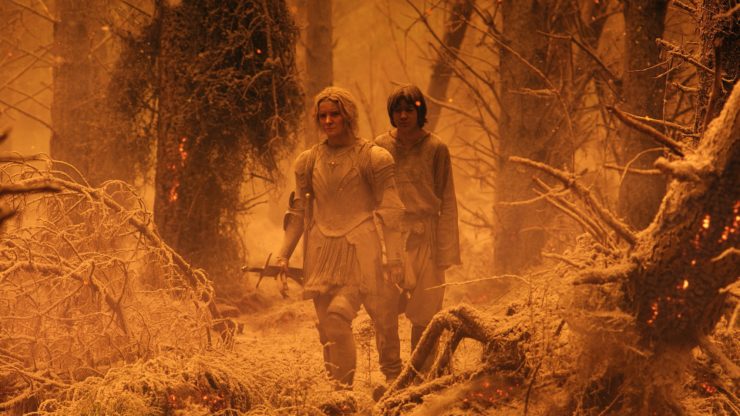In “The Eye,” episode seven of The Rings of Power, the show tackles themes of sacrifice and risk, of being separated from loved ones and of laying down guilt. But whether it executes these themes well is another matter. Also, everything’s on fire.
Recap
Galadriel wakes in a red, smokey landscape. All around her are dead bodies and burning buildings. She finds Theo and tells him to stay with her. Elsewhere, Míriel gathers survivors. She helps Isildur free Valandil from a fallen wall, but Ontamo is dead. While helping others out of a burning building, Míriel is hit in the face by a burst of flame and Isildur is caught under the collapsing frame.
Nori and her family arrive at the grove to find many of the trees have been burned. Sadoc tells them of an old story about great mountains to the south that could spit fire rock, which would wake when a new evil was rising. When Nori is reluctant to ask the Stranger if he can fix the trees, Sadoc decides to ask himself. The Stranger seems to be having some success when a huge branch breaks loose, and Nori narrowly saves her sister from being crushed.
In Khazad-dûm, Elrond offers Durin III gifts from the elves in exchange for access to the mithril mines. He tells Durin III that he should not trust elves, but that he can trust Elrond, and goes to one knee before the king. Durin III speaks alone with Durin IV, telling him that Dwarves understand that all things must die, and that he will not risk dwarven lives to help the elves cheat death.
Buy the Book
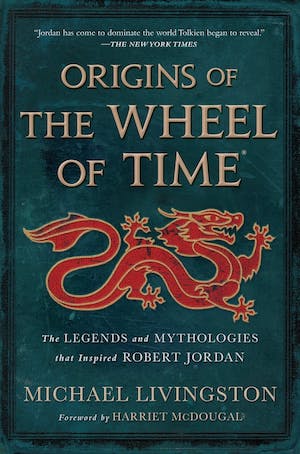

Origins of the The Wheel of Time
Durin IV tells Disa the news. She suggests defying the king’s will, but Durin resists. Elrond overhears their discussion and he and Durin bid each other farewell. Elrond returns the nugget of mithril, but when Durin sets the ore down beside the corrupted leaf from Lindon it begins to restore itself, and Durin calls Elrond back.
Galadriel tells Theo that the lands cannot be saved and begins leading him out, towards where the Númenórean ships lie at anchor. Elsewhere, Míriel and Valandil inform Elendil of Isildur’s death. Elendil realizes that Míriel has been blinded. Sadoc gives the Stranger directions to find big folk settlements, as well as a drawing he has made of the stars from the destroyed page. Nori gives the Stranger an apple for his journey.
While camping, Galadriel tells Theo about the loss of her brother, as well as her husband, Celeborn, who went off to war and never returned. Theo tells Galadriel that what has happened is his fault, because he gave power to the enemy. She disagrees and tells him to let go of the burden of this day. A party of orcs passes, and she restrains Theo from drawing his sword and nearly revealing their location.
Durin works the mines alone, accompanied by Elrond. Elrond admits that he lost the rock-splitting contest on purpose. Durin tells Elrond that dwarves have secret names known only to their families, and starts to tell Elrond his, but Elrond tells him to wait. Durin breaks through into a huge cavern of mithril, but turns to see that his father has caught them. Elrond is thrown out of Khazad-dûm. Durin III and IV argue. When Durin IV insists that Elrond is as much a brother to Durin IV “as if he had been fired in my own mother’s womb,” Durin III is infuriated, and tears Durin IV’s crest off his neck.
Nori awakes to see that all the orchard has regrown, and the Harfoots begin gathering in the harvest. That night, Nori and Poppy observe the Dweller (Bridie Sisson), the Ascetic (Kali Kopae), and the Nomad (Edith Poor) examining the tree the Stranger healed. Nori calls out to redirect them away from the Stranger, and the three appear before her. Largo tries to protect his daughter with a torch, but the Dweller causes all the Harfoot wagons to burst into flame.
The Southland refugees reach the Númenórean base. Theo finds Arondir and his mother. Galadriel is grief stricken at the losses the Númenóreans have suffered, but Míriel tells her to save her pity for their enemies, vowing that Númenor will return. Galdriel answers that the elves will be ready. Largo gives a speech about how the strength of the Harfoots is in staying true to each other, and facing whatever comes. Nori, Poppy, and Marigold decide to go after the Stranger to warn him, and Malva convinces Sadoc to go as well.
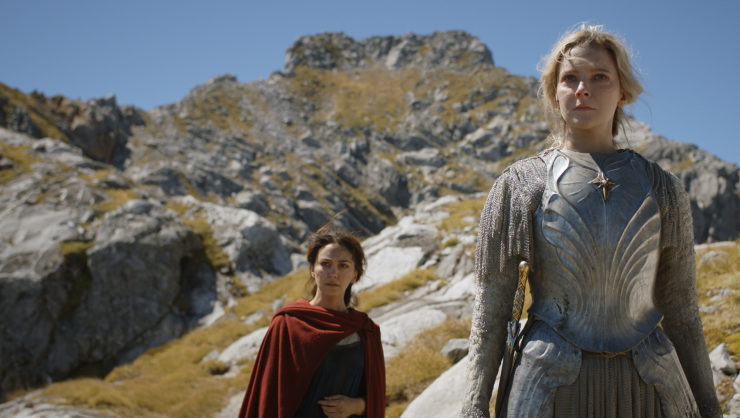
The Southlander refugees prepare to travel to an old Númenórean colony to start a new life. Galadriel learns that Halbrand has been badly wounded and needs Elvish healing. He vows to return, and the people cheer as he and Galadriel mount horses and ride off.
Disa tells Durin that his father has grown too old and suspicious, and that no matter how many crests he hurls to the floor, one day the Kingdom will be theirs. Down in the mines, Durin III orders the mithril cavern to be sealed up, and tosses the leaf into it. The leaf falls a great long way before landing, where it bursts into flame. A Balrog emerges from the darkness.
In the flaming ruins of the Southlands, Adar tells his children this land is their home now. He tells them that it will have a new name, and looks into the distance at the volcano, as the caption reading “The Southlands” burns away, to be replaced by “Mordor.”
Commentary
If there’s one thing The Rings of Power isn’t going for, it’s subtlety. Which isn’t bad, necessarily—I just wish the show would learn when to pull back a little. I actually laughed when the episode titled “The Eye” opened with that close-up, upside-down shot of Galadriel’s eye and the reflected volcano in it. And the end with “The Southlands” changing to “Mordor” was just silly. It almost feels like the show doesn’t trust the audience to have figured out what’s going on, as though they were giving us all an elbow nudge saying “Eh, eh? This is how Mordor happened! See what we did there? You see?”
Take the scene where the Lindon leaf tumbles down and down into the depths of Khazad-dûm, past all the tendrils and veins of mithril, to land on a rock floor far below and burst into flame. It’s a really good shot, and nicely foreboding, but then it’s spoiled by actually having the whole balrog appear. There are moments, in film and television making, when less is more, where you can spark the audience’s imagination and let it run to possibilities. I wish The Rings of Power would tip a little bit more in that direction. Especially given the cultural familiarity with The Lord of the Rings and the fact that they’re reminding us of it constantly with all the imagery they’re pulling from Jackson’s films. (I mean, they made the balrog look and move identically. I know there’s a general consensus around what balrogs look like, but the details could still have been creative and new.)
On the other hand, there are also a lot of moments when the show could use some more clarity. For example, everything that happens with Nori and the Stranger. I can see what the writers were trying to do—they wanted to have a reason for Nori’s faith in the Stranger and in herself to waver, and then a reason for her to choose to renew it. And I love the thematic transition from Nori in episode one saying “I know I’m just a Harfoot and I’m not important,” to Largo talking about why the Harfoots matter, why they are important, just as they are. Unfortunately, the execution falls pretty flat.
It’s perfectly realistic that Nori was scared by what happened with the healing ice (or whatever it was), but it doesn’t really seem in character for her to be that afraid of the Stranger now. She doesn’t seem to have suffered any lasting physical damage, and she has no reason to believe that the Stranger intended to hurt her. Which isn’t to say that she can’t feel the way the show implies, I just think that, given what a strong-willed character she is, we needed to hear from her about what was actually going on. We do have the fact that she tells her mother that she’s just a little Harfoot who can’t make a difference, but I think the scene would be more profound if we’d had more lead up to why this scary moment has affected Nori more than, say, the threat of being abandoned by her people as punishment for helping one of the big folk.
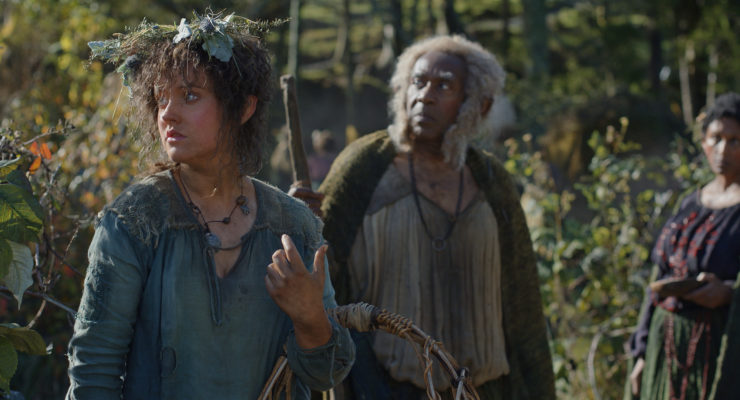
I really wanted to like Largo’s speech, but it was kind of all over the place. First Sadoc asks him to give the Harfoots “a moment to weep” and Largo asks if Sadoc believes that’s all they’re capable of now. I’m not sure why “a moment” translates to “it’s all we can do” in Largo’s mind, but I’m interested in the idea of such a conversation. But instead of continuing with that debate, Largo does a sort of sideways segue into talking about how the one thing Harfoots are good at is standing by each other and continuing to walk, no matter how difficult the path gets. And I couldn’t help thinking about how the Harfoots have a tradition of leaving behind anyone who can’t pull their own wagon, which was also nearly Nori’s punishment for being involved with the Stranger as well. Even the lesser judgment Sadoc passed instead was basically as good as a death sentence—we see that the family only survives because the Stranger was able to help them.
So when Largo argues that the Harfoots are good at being true to each other, I wasn’t as committed to it as Smith’s acting warranted. Thematically it was apt, since Largo was the one nearly abandoned because of his injury, but I felt like the speech should have been a little bit more about his desires for what the Harfoots could be, rather than insinuating that this is the first time they’ve faltered under such a test.
That being said, the acting from everyone in this scene was lovely, and I’m a big fan of the way Malva in particular spoke about her change of heart and convinced Sadoc to go with the girls. The concept of a trail finder is a really cool one, and I noticed (though it’s been in the costume the whole time) that Sadoc wears a chain necklace that appears to have a ring on it, which is a pretty neat nod to the future part Hobbits will play in the fate of the world. Now that’s some subtle and effective storytelling.
The scenes between Durin IV and Elrond, and the scenes between Durin IV and his father, were all heartbreaking, and beautifully acted. I love the way the show writes about the dwarves, and the dialogue here strikes a nice balance in being poetic without being cheesy or stilted, as it often is when the elves talk. I loved the story of Durin IV’s birth and the vision the King had of his son’s future. And the belief that the Dwarves have about how Aulë created them from rock (which craves the eternal) and fire (which understands that all things die and come to ash) was a genius detail, and makes sense of the way Dwarves are situated between the immortal race elves and the short-lived race of men. Long-lived and solid, the Dwarves are steadier than men, who fear and flee from death, and yet have a respect for death and the passage of time that the elves, who rarely have to face such things, do not.
The writers have stated in interviews that the goal of the show is to tell a story about the importance of helping each other. It’s a theme that has been very clear in some areas and very off in others. (See my comments above re: Nori and Largo.) I find as I watch the The Rings of Power that the show often feels like they’re filming from the first draft of a script, rather than a finished version, and it’s especially true of this episode in particular. You can see a lot of interesting themes throughout the show. There are some beautifully scripted moments. And yet there are also so many scenes that drag, or are overwrought. Many of the themes are either not built up before the pivotal moment, or that are built up only to falter at the conclusion.
To be honest, I still really don’t understand the point of Halbrand’s character. He hasn’t done anything interesting since we met him, and I don’t understand why the villagers would rally so easily around the king who showed up three minutes before everything was destroyed. I kind of hoped everyone would decide they should keep following Bronwyn instead, which would have been an interesting problem for Halbrand to grapple with—the idea that he finally accepted his apparent destiny only to find he wasn’t wanted. I did appreciate his vow to Galadriel that he won’t abandon the lands to the Shadow, but it would have been more effective if he wasn’t riding this weird wave of “because he’s the King” and because his haircut reminds us of Aragorn and Boromir.
Really, everything the show has tried to do with Halbrand and Galadriel and their related trauma it manages to achieve instead in two scenes between Galadriel and Theo. We actually have gotten to know Theo through his struggles over the course of the show, the way he was drawn to the power of the blade, the way he alternated between determination and doubt in the face of such a terrible enemy. The heritage of the Southlanders, alluded to by the watch elves and by Arondir, is fealty to Morgoth, and the show does such a good job showing how that weight rests on all of the villagers, and especially this otherwise ordinary teenager.
And since we haven’t seen any of Galadriel’s formative moments, seeing her relate to Theo, who we know, makes her seem more real and fully developed as a character. Everything she said about Celeborn was beautifully written as well, and I appreciated that we were finally given real details about her and about the person she lost. The fact that she used to dance and that Celeborn was drawn to that, the fact that she teased him and called him a silver clam in his ill-fitting armor—these details make her feel like a person and not a trope. And as a result, her grief and loss is more relatable for us than the loss of Finrod, even though we never saw Celeborn on screen. The way she advises Theo about how not to get lost in his pain and feelings of guilt were really good moments of character development for her as well, and again, actually lets us see how Galadriel came to be the person she is today.
The fact that Theo now carries Galadriel’s sword instead of the cursed blade is another example of when the show actually gets the symbolism just right. And though I didn’t care much about the Southlanders shouting strength to a King they just met, I had literal chills when Theo raised the elven sword and whooped “Strength to the Southlands!” Also, I’m now wondering if Celeborn is going to show up in a future season, somehow not dead after all (he shouldn’t be dead; the two of them are in charge of Lothlorien later on). That would be pretty cool, and good character work for Galadriel. I mean, no wonder she wants to do nothing but fight. Everyone she loved is dead! And if Celeborn was somehow captured, it might add some complexity to the dialogue around the elves taken by Morgoth.
Missing loved ones who are presumed dead (but not actually dead) is a big theme of this week’s episode, since Theo (and the audience) spends most of it uncertain if his mother and Arondir survived. There is also Isildur, who is presumed dead but the audience knows must have survived. We can make the same deduction about Celeborn, and we also know that the question of the mithril isn’t over yet, since we know that Elrond and many other elves are still around in the Third Age and that more mithril does get mined.
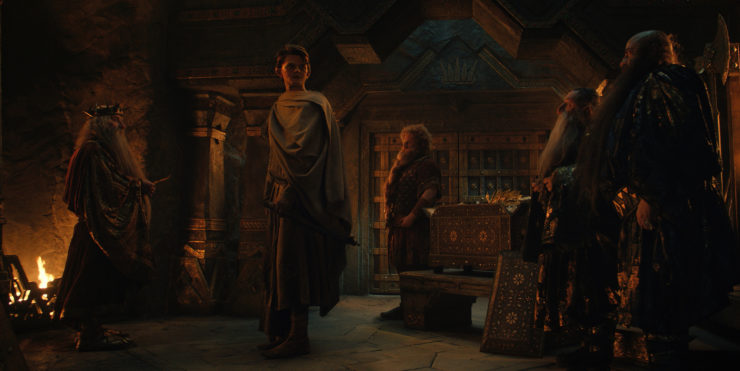
I really wish the show had let Elrond have a full speech about the fact that he, being half-elven, can see the elves in ways they cannot see themselves. It’s such a clever idea, and there’s a lot in Tolkien canon to work with—the elves are not as pure and untouchable as they present themselves, and this is the cause of much strife both within their own ranks as well as with the dwarves and men of Middle-earth. But Elrond doesn’t explain what he sees, doesn’t name the faults of the elves or make an actual plea as to why they still deserve Durin III’s mercy. He just states the fact and then moves on, which is a real missed opportunity, and also not a very good way of convincing Durin III to trust him.
I also adored the cultural differences between Elrond and Durin vis-a-vis naming traditions. Of course the elves, who don’t die except if they’re killed in battle, wouldn’t understand the tradition of passing on family names. Durin’s attempt to tell Elrond his secret name made me as teary as it made him to realize that he might have to let his friend die.
Obviously I’m on Elrond and Durin IV’s side here, for the sake of their beautiful romance and friendship, and also because refusing to help feels a little bit like allowing genocide, even if it seems to be naturally occurring. However, if the lesson the show is trying to teach is that people should help each other, I’m not sure it actually achieves that here. Because the viewer knows the threat of the balrog, and the destruction that does eventually come to Khazad-dûm. If Durin III’s argument were different it still might work—perhaps if his entire reasoning was only that the elves can’t be trusted and that cheating death is wrong—it might come off better. But his concern is ultimately that he sees a real risk to dwarven lives, a concern that is ultimately born out both by the greater canon and by the episode itself. It’s hard, then, to say that the show is condemning Durin III’s choice, even as we are naturally going to side with his son.
Disa’s speech to her husband is beautiful, and Sophia Nomvete has my heart forever, but I don’t know how I’m supposed to take anything that the episode is saying about what the future looks like. And I think perhaps part of the problem is that the source material for The Rings of Power is a history book. The show could have picked out any single tale from the Silmarillion or any other pieces of Tolkien’s writing. Instead, it has taken a very wide view of the stories it’s telling, so wide that it’s hard to hold onto a single thematic narrative. It’s very different to look back on the long arc of history and see the unintended consequence of morally good choices than it is to try to put all those complexities into a single story.
If the struggle between Durin III, Durin IV, and the elves is about helping those in need, just make the story about that. The audience knows that someday the digging for mithril will bring tragedy. The show can allow us to remember that, can even hint at it to remind us, letting the knowledge color the edges of our perception the way Sadoc’s memory of his ancestor’s story of sleeping volcanos colors his understanding of the modern world. We don’t need The Rings of Power to hit us in the metaphorical thumb with a metaphorical hammer. We just need it to be a little clearer, a little more closely edited. The themes are there, but they need to be brought out of the mud and into the light.
Despite his problems with the show, Sylas K Barrett will forever be grateful to The Rings of Power for all the great dwarf lore, for Princess Disa, and for the way that Durin IV and Elrond look at each other in the torchlight.










